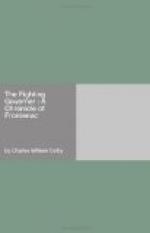But for the moment the French were heavily burdened by the venality of La Barre, who subordinated public policy to his own gains. We have now to record his most egregious blunder—an attempt to overawe the Iroquois with an insufficient force—an attempt which Meulles declared was a mere piece of acting—not designed for real war on behalf of the colony, but to assist the governor’s private interests as a trader. From whatever side the incident is viewed it illustrates a complete incapacity.
On July 10, 1684, La Barre left Quebec with a body of two hundred troops. In ascending the river they were reinforced by recruits from the Canadian militia and several hundred Indian allies. After much hardship in the rapids the little army reached Fort Frontenac. Here the sanitary conditions proved bad and many died from malarial fever. All thought of attack soon vanished, and La Barre altered his plans and decided to invite the Iroquois to a council. The degree of his weakness may be seen from the fact that he began with a concession regarding the place of meeting. An embassy from the Onondagas finally condescended to meet him, but not at Fort Frontenac. La Barre, with a force such as he could muster, crossed to the south side of Lake Ontario and met the delegates from the Iroquois at La Famine, at the mouth of the Salmon River, not far from the point where Champlain and the Hurons had left their canoes when they had invaded the Onondaga country in 1615.
The council which ensued was a ghastly joke. La Barre began his speech by enumerating the wrongs which the French and their dependent tribes had recently suffered from the Iroquois. Among these he included the raid upon the Illinois, the machinations with the English, and the spoliation of French traders. For offences so heinous satisfaction must be given. Otherwise Onontio would declare a war in which the English would join him. These were brave words, but unfortunately the Iroquois had excellent reason to believe that the statement regarding the English was untrue, and could see for themselves the weakness of La Barre’s forces.
This conference has been picturesquely described by Baron La Hontan, who was present and records the speeches. The chief orator of the Onondagas was a remarkable person, who either for his eloquence or aspect is called by La Hontan, Grangula, or Big Mouth. Having listened to La Barre’s bellicose words and their interpretation, ’he rose, took five or six turns in the ring that the French and the savages formed, and returned to his place. Then standing upright he spoke after the following manner to the General La Barre, who sat in his chair of state:
’Onontio, I honour you, and all the warriors that accompany me do the same. Your interpreter has made an end of his discourse, and now I come to begin mine. My voice glides to your ear. Pray listen to my words.




